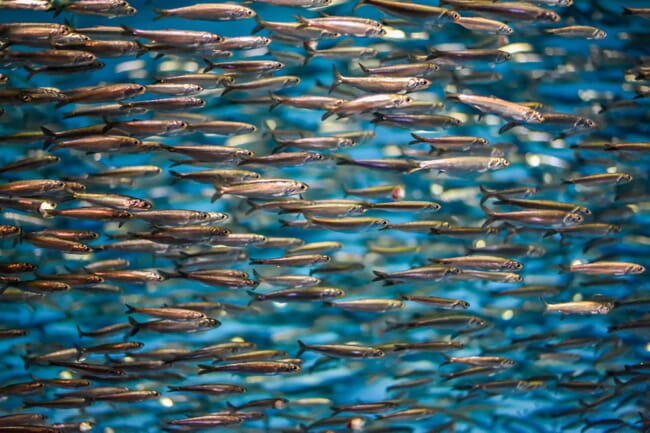Produced by Changing Markets Foundation, Feedback and partner NGOs the Floundering Around report argues that Europe’s 33 major food retailers are failing to address key sustainability challenges in aquaculture. Despite being presented as a more environmentally friendly and sustainable form of protein, aquaculture in its current form is driving overfishing of the oceans, food insecurity in the Global South and poor fish welfare.
Key sustainability concerns
According to the report, supermarkets – thanks to their financial heft and role as intermediaries between consumers and the fish farming industry – should be responsible to drive forward transformative change in the aquaculture sector by demanding higher sustainability and fish welfare standards.
However, the report reveals that across six European countries, 76 percent of supermarkets display a “near-total lack of substantive policies” to address the lack of sustainability and transparency in their farmed fish supply chains.
The report notes that no retailer has a clear target for the reduction and phased-out elimination of wild-caught fish in feed, despite nearly 20 percent of the world’s marine fish catch - 18 million tonnes in 2018 - is taken out of the ocean and converted to fish meal and fish oil (FMFO) to feed farmed animals, threatening food security in regions including West Africa and the Pacific coast of South America.

The report shows only very few retailers are taking positive steps towards eliminating or reducing the use of wild caught fish in feed. French retailer Auchan has a target for transitioning 50 percent of the farmed seafood it sells to feed which contains less or no FMFO, while Tesco has a roadmap on how to accelerate the inclusion of alternative ingredients in feed. However, as a whole, the retail sector, is failing to grapple with this critical issue which has devastating impacts on marine biodiversity and communities in some of the poorest regions of the world.
“It is disappointing to see such a complete lack of leadership amongst European supermarkets when it comes to eliminating the use of wild-caught fish in aquaculture,” said Nusa Urbancic, campaigns director at the Changing Markets Foundation. “For years, we have documented the devastating impacts fishing for feed has on oceans and on food security of vulnerable communities in the Global South. Supermarkets pay lip service to sustainability in their public statements, but refuse to take meaningful action to eliminate this damaging practice from their supply chains.”
Alongside the lack of attention to supply chain sustainability, the report also found that while UK retailers have taken some steps to improve supply chain transparency in recent years, they are failing in their duty to inform customers of the origin of the farmed fish and seafood they sell and none of the retailers reports on the composition of feed used in their supply chains. Twenty-seven percent of European retailers do not include producer or farm name on fish labels, do not require public reporting by their suppliers on the composition and origin of feed used on their farms, and do not appear to have any reporting on fish welfare indicators in place.
Fish welfare concerns
The report also highlights significant shortcomings, when it comes to fish welfare. Half of retailers do not appear to require any reporting from their suppliers on fish mortalities and escapes, while very few retailers have safeguards in place to prevent high mortality rates on fish farms they source from.
Only Waitrose has detailed procedures in place for suppliers to report on mortality and escape rates and said it would blacklist farms with high mortality rates if no improvement was forthcoming. While Tesco does not have an upper limit on mortalities, it told us that in critical situations it would stop sourcing.
The report flags up that mortality rates are hard to obtain. However, it points out that on salmon farms in Norway they stood at 15 percent in 2019, while figure may be higher in other countries.
Nusa Urbancic said: “Industrial aquaculture causes untold suffering and yet most European retailers are failing to take steps to improve fish welfare in their supply chains. In the UK, salmon producers are planning to double production by 2030 which will almost certainly result in worsening conditions on farms. Retailers must push their suppliers to farm better or face serious reputational consequences.”
Jessica Sinclair Taylor, head of policy and media at Feedback said: “Left unchecked, this unsustainable, unmonitored and unfair industry will cause irreversible environmental and societal impacts. We call on all the major European Food Retailers to recognise the vital role they can play in addressing the unsustainable nature of the aquaculture sector and demand a shift to more sustainable fish farming practices.”
Positive change required
The report is calling on retailers to recognise the role that they can play in lessening the devastating impact of the global aquaculture sector, by calling for:
- A commitment to phasing out the use of wild-caught fish in aquafeed and other farmed animal feed by 2025.
- The introduction of strict requirements on how farmed fish and seafood species are reared and slaughtered.
- The blacklisting of fish farms that have consistently high fish mortality rates.
- The introduction of greater transparency for consumers through improved labelling. This ties into customers’ right to know the origin of the farmed fish they buy, the origin and composition of what it was fed, and how it was reared.
Meanwhile the report calls on consumers to recognise the role that they can play, by:
- Demanding more of supermarket retailers and putting pressure on them to improve the transparency of their farmed fish (and wild-caught fish) supply chains.
- Limiting seafood consumption, especially farmed carnivorous species (such as salmon or prawns) that depend on the use of FMFO produced from wild fish.




